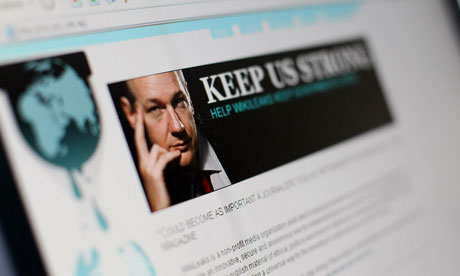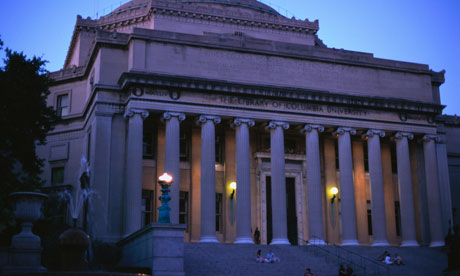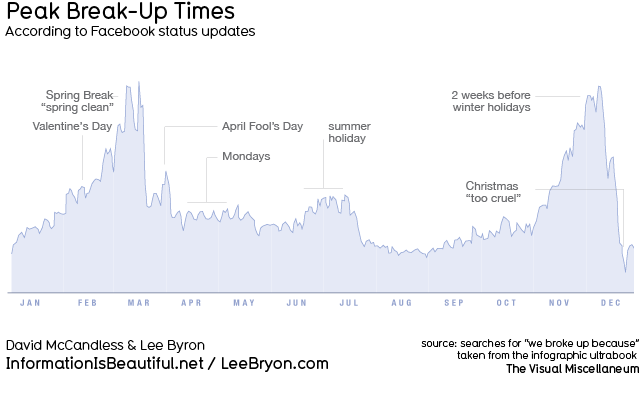WikiLeaks Live Updates 12.06
Via The Guardian
WikiLeaks US embassy cables: as it happened
• Julian Assange’s account frozen by Swiss bankers
• Burmese general considered buying Manchester United
• Qatar accused of using al-Jazeera as tool of diplomacy
• Full coverage of the WikiLeaks cables
Today’s WikiLeaks US embassy cables live updates
 WikiLeaks has been blocked from being accessed by federal employees of the US, because the files are still seen as classified. Photograph: Thomas Coex/AFP/Getty Images
WikiLeaks has been blocked from being accessed by federal employees of the US, because the files are still seen as classified. Photograph: Thomas Coex/AFP/Getty Images
7.45am: A second working week of WikiLeaking kicks off with yet more controversy. WikiLeaks has published a list of “critical infrastructure and key resources” across the world. The Times dubs it a “targets for terror” list.
The BBC’s diplomatic correspondent Jonathan Marcus also sees it as a potential hit list: “If the US sees itself as waging a ‘global war on terror’ then this represents a global directory of the key installations and facilities – many of them medical or industrial – that are seen as being of vital importance to Washington,” he writes.
He describes the cable as “probably the most controversial document yet from the Wikileaks”.
Meanwhile, WikiLeaks continues to make ripples across the world. The Daily Beast tracks the personnel changes forced on the US diplomatic service by disclosures.
The Obama administration is planning a major reshuffling of diplomats, military officers and intelligence operatives at US embassies around the world out of concern that WikiLeaks has made it impossible – if not dangerous – for many of the Americans to remain in their current posts, writes Philip Shenon.
“In the short run, we’re almost out of business,” a senior US diplomat told the Reuters news agency, according to a follow-up of the Daily Beast article in the Independent.
The fate of WikiLeaks and its founder, Julian Assange, continues to attract much attention. The New York Times reports that hundreds of WikiLeaks mirror sites have sprung up to prevent efforts to censor its disclosures. Similarly the Guardian reports on an online backlash to shut the site down.
Australia’s attorney general, Robert McCelland, said that Australia would provide consular assistance to Assange if he returned to Australia. But at the same time he said his country was providing ”every assistance” to US authorities in their investigation against WikiLeaks.
Here are the headlines from the Guardian’s latest trawl through the cables:
• Al-Jazeera changed coverage to suit Qatari foreign policy
• Cables portray Saudi Arabia as a cash machine for terrorists
• Lebanon told allies of Hezbollah’s secret network
• Brazil denied existence of Islamist militants
• WikiLeaks cables blame Chinese government for Google hacking
You can follow all of last week’s disclosures and reaction on our live blogs on the cables. And for full coverage go to our US embassy cables page or follow our US embassy cable Twitter feed @GdnCables.
8.06am: A new edition of the weekly German magazine Der Spiegel is published today with a slew of new stories from the cables.
The magazine, one of the five media organisations – including the Guardian – to have had early sight of the cables, focuses on what they reveal about the conflict in Iraq.
The Americans allowed themselves to get entangled in the Sunni-Shia conflict while being systematically outmanoeuvered by the Iranians, according to 5,500 about the war and its aftermath.
It also looks at what the cables say about Xi Jinping, China’s probable future leader and the inner workings of the Chinese politburo.
In an interview with the magazine, Prince Turki bin Faisal of Saudi Arabia, says America’s “credibility and honesty” has been damaged by the leaks. He describes the cables as “a hodgepodge of selectivity, inaccuracy, agenda pursuit, and downright disinformation”.
8.24am: The Today programme presenter Jim Naughtie is in all sorts of trouble after substituting a crucial letter in the surname of culture secretary Jeremy Hunt, and then corpsing his way through the headlines.
 Before the gaffe Naughtie sneered at the Guardian’s WikiLeaks coverage. In a review of the papers at 6.12am he sarcastically described today’s Guardian’s splash as “another story that will make us all fall off our chairs with astonishment”.
Before the gaffe Naughtie sneered at the Guardian’s WikiLeaks coverage. In a review of the papers at 6.12am he sarcastically described today’s Guardian’s splash as “another story that will make us all fall off our chairs with astonishment”.
8.49am: Much of the media continues to portray Julian Assange as a Bond villain holding the world to ransom.
Here’s today’s Daily Mail:
Julian Assange has distributed to fellow hackers an encrypted ‘poison pill’ of damaging secrets, thought to include details on BP and Guantanamo Bay.
He believes the file is his ‘insurance’ in case he is killed, arrested or the whistleblowing website is removed permanently from the internet.
The release of the “terror targets” plays into that view.
8.59am: The broadcaster al-Jazeera has denied that it is being used as a tool of Qatari diplomacy, as one of the cables claims.
In a statement it said:
“This is the US embassy’s assessment, and it is very far from the truth. Despite all the pressure Al Jazeera has been subjected to by regional and international governments, it has never changed its bold editorial policies which remain guided by the principles of a free press.”
9.21am: More evidence that the release of the cable about the key infrastructure sites is being used as stick to beat WikiLeaks.
Here’s a tweet from Times columnist David Aaronovitch.
I don’t see how the strategic sites cable fits into J Assange’s heroic rubric of disclosure. It looks more like like vandalism. #wikileaks
9.39am: The Guardian took a weekend break from liveblogging the cables, but the Nation didn’t. They work harder in America. Here’s Greg Mitchell’s roundup of Sunday’s WikiLeaks news.
My colleague Peter Walker is working on a summary of the WikiLeak revelations from today and over the weekend. While we wait for that, the respected analyst, Juan Cole, has a roundup of the weekend’s top 10 disclosures about the Middle East.
9.58am: While US students have been told that reading the cables could harm their careers, students in Indian are being told the opposite. Trainee diplomats at India’s Foreign Services Institute (FSI) have been urged to emulate the prose style displayed by the diplomats in the cables.
“The Ministry of External Affairs is asking its youngsters to read them [the cables] and get a hang of the brevity with which thoughts and facts have been expressed,” the Indian Express reports.
I’d recommend cables written by former US ambassador in Moscow William Burns, especially this one about a drunken wedding in Dagestan.
The cable is described as an “insightful, literate, and wry field report” by Reuel Marc Gerecht in the New Republic. He also likes the cables by Tatiana Gfoeller, the ambassador to Kyrgystan who reported on Prince Andrew’s rudeness.
10.23am: This is useful – a search engine for all the hundreds of cables already published by WikiLeaks. You can use it to see what everyone else is searching for too.
10.36am: Vancouver police have been asked by a lawyer to investigate whether a former aide to the Canadian prime minister broke the law when he called for the assassination of Julian Assange.
Last week Tom Flanagan called for the contract killing of the WikiLeaks founder in a live TV discussion. He later said he regretted the remarks.
Gail Davidson, a co-founder of the group Lawyers Against the War, has made a formal complaint to the police in Canada, according to the Vancover Sun.
In his online chat with Guardian readers last Friday Assange said those who called for his killing should be charged with incitement to murder.
11.09am: The Yemeni government faces some awkward questions later this week about why it lied about US attacks against al-Qaida.
“We’ll continue saying the bombs are ours, not yours,” Yemen’s president Ali Abdullah Saleh told David Petraeus in a now infamous cable in January this year.
Yemen’s parliament will question the deputy prime minister over the cables, MPs told Reuters.
Rashad al-Alimi, Deputy Prime Minister for Security and Defence Affairs, has been asked to attend parliament on Wednesday to discuss the content of the secret U.S. documents, several MPs confirmed.
A government official told Reuters Alimi would go to parliament to answer parliamentarians’ questions, but said the information in the leaked documents were inaccurate.
“Of course this (information in the cables) is not true. Everyone in the world is complaining about the inaccuracies of these documents,” he said, speaking on condition of anonymity.
11.30am: The company behind @Tweetbackup, the only Twitter account followed by WikiLeaks, has become the latest Tech provider to consider cutting off support to the whistleblowing stie.
“We just became aware of the Wikileaks account on Friday,” vice-president of marketing at Backupify told Networkworld. “We’re currently evaluating the situation.”
12.12pm: Sir Malcolm Rifkind, former UK foreign secretary and chair of the intelligence and security committee, has spoken out against the release of the cable listing those key infrastructure sites and resources.
Speaking to BBC News, he said:
This is a gift to any terrorist organisation trying to work out what are the ways in which it can damage the United States. It is grossly improper and irresponsible of Mr Assange and his WikiLeaks organisation to allow that information into the public domain.
For things that reveal Nothing New™, the WikiLeaks documents sure are generating a lot of news headlines around the worldless than a minute ago via web Glenn Greenwald
Glenn Greenwald
ggreenwald
12.58pm: Salon’s Glenn Greenwald continues to be one of the biggest cheerleaders for WikiLeaks and the disclosure of the these documents.
1.37pm: The United States needs to work “put in a lot of hard work” to re-establish confidence with the international community, according to Afghanistan’s foreign minister.
Speaking at news conference Zalmai Rassoul said: “Confidence should come back at all levels, it’s going to be a difficult job, but it’s necessary.”
1.43pm: David Leigh, the Guardian’s investigations’ editor who has done much of the reporting on the cables, responds to the Times story about “terror sites”. He says the Guardian chose not to publish the story.
Strange to see the Times publishing a sensitive #Wikileaks cable which the #Guardian declined to do. Murdoch is helping terrorists?
1.51pm: The foreign secretary William Hague said WikiLeaks’ publication of those vital global sites was “reprehensible,” according to the BBC.
Was the Times also reprehensible for highlighting it? Was it being irresponsible by trying to highlight the irresponsibility of WikiLeaks? And were the Guardian right not to publish it? This is tricky stuff and way beyond my pay grade. Please help me out in the comments section.
While you ponder all that here’s that summary of what’s we’ve learned today, with links to summary’s of the revelations for each of the previous seven days.
2.21pm: Republican presidential hopeful Mike Huckabee has repeated his suggestion that those responsible for the leaks should be executed.
Last week he called for the death penalty for the whistleblower. At a Bet El Dinner for the Jewish community in New York last night he said whoever leaked the material should be “prosecuted to the fullest extend of the law”. His comments were greeted with applause.
Huckabee is trying to have it both ways. He went on to say that Israel should draw comfort from what the cables revealed about the the Arab world’s hostility to Iran.
2.36pm: James Ball an investigative journalist working with WikLleaks, asks why hasn’t The Guardian been hit by tech companies in the same way as WikiLeaks.
In a defiant post for the Index of Censorship, he writes:
Duplicate copies of Wikileaks are now loaded hundreds of different servers worldwide. Even PayPal’s closure of Wikileaks’ account has so far proved little more than an annoyance.
But even these could all vanish tomorrow, thanks to an even more traditional fallback: old media. The New York Times, Guardian, Der Spiegel, Le Monde and El Pais are all running Wikileaks material.
All shared the same editorial judgement as Wikileaks having seen the material: they judged it in the public interest and chose to run it. At this point, these sites are running the same cables as Wikileaks. They have contributed to the redactions.
The Guardian website, at the time of writing, actually contains more US material than Wikileaks’ own. None have faced the political or technical backlash of the main Wikileaks site, yet all would have to be taken offline to bury the Embassy Cables story.
2.44pm: Wow, we certainly didn’t know this:
 The leader of Burma’s military junta was considering buying Manchester United for $1bn, according to the latest cable seen by the Guardian.
The leader of Burma’s military junta was considering buying Manchester United for $1bn, according to the latest cable seen by the Guardian.
Than Shwe, commander in chief of the armed forces and a fan of United, was urged to mount a takeover bid by his grandson, according to a cable from the US embassy in Rangoon. It details how the regime was thought to be using football to distract its population from ongoing political and economic problems.
Would the general have got through the Premier League’s fit and proper persons test?
My boss tweets:
“Would’ve been better than the Glazers”, grumbled one Man U fan not far from the Guardian newsdesk.

3.00pm: Interpol have issued this online wanted poster for Julian Paul Assange.
Here’s the notice. It confirms that Assange is wanted by the Sweedish authorities in connection with allegations about “sex crimes”.
He denies the charges.
Yesterday, Assange’s lawyers they were being watched by the police.
Jennifer Robinson and Mark Stephens of the law firm Finers Stephens Innocent told the Guardian they had been watched by people parked outside their houses for the past week.
“I’ve noticed people consistently sitting outside my house in the same cars with newspapers,” said Robinson. “I probably noticed certain things a week ago, but mostly it’s been the last three or four days.”
Stephens said he, too, had had his home watched. Asked who he thought was monitoring him, he said: “The security services.”
3.15pm: Here’s that William Hague outrage in full.
Speaking to BBC radio he said:
There is great concern of course about disclosing a list of targets that could be of use to terrorists or saboteurs.
I think it is absolutely reprehensible the publication is carried out without regard to wider concerns of security, the security of millions of people
![]() Time to call it a day again. Come in Richard Adams.
Time to call it a day again. Come in Richard Adams.

3.32pm: Thank you Matthew, and good morning from a chilly Washington DC, where many State Department officials are returning to work with jetlag after their hurried trips abroad to “explain” the contents of the US embassy cables to their foreign counterparts.
3.47pm: Triumphs in journalism, part 874 (Washington Post edition): as we blogged here last week, on Thursday the Washington Post’s Al Kamen buried a story in his column that the Federal government was forbidding employees to access the WikiLeaked US embassy cables since they were still classified. By Sunday the Post finally got around to reporting the same fact in a news story.
Are standards slipping at the Post? Well, today’s front page manages two cliches and a mixed metaphor in the space of one six-word headline (seen here in the top left corner): “Customs pushed envelope to hit goal”.
 Columbia University. Well, the nice-looking bit. Photograph: Corbis
Columbia University. Well, the nice-looking bit. Photograph: Corbis
4.06pm: Last week there was consternation after a section of Columbia University sent an email to its students warning them against accessing or tweeting the leaked US embassy cables because of the future repercussions for their career in the US government. Now the dean of Columbia’s School of International and Public Affairs sends a clarification to the “SIPA community”:
Last Tuesday, SIPA’s Office of Career Services received a call from a former student currently employed by the US Department of State who pointed out that the US government documents released during the past few months through WikiLeaks are still considered classified. The caller suggested that students who will be applying for federal jobs that require background checks avoid posting links to these documents or making comments about them on social media sites such as Facebook or through Twitter.
OCS emailed this cautionary suggestion to students, as it has done many times with other
information that could be helpful in seeking employment after graduation. We know that many students today share a great deal about their lives online and that employers may use that information when evaluating their candidacy. Subsequent news stories have indicated that the Department of State has issued guidelines for its own employees, but has not issued any guidelines for prospective employees.Freedom of information and expression is a core value of our institution. Thus, SIPA’s position is that students have a right to discuss and debate any information in the public arena that they deem relevant to their studies or to their roles as global citizens, and to do so without fear of adverse consequences. The WikiLeaks documents are accessible to SIPA students (and everyone else) from a wide variety of respected sources, as are multiple means of discussion and debate both in and outside of the classroom.
Should the US Department of State issue any guidelines relating to the WikiLeaks documents for prospective employees, SIPA will make them available immediately.
Sincerely, John H Coatsworth, Dean
Fact: Columbia University was originally named King’s College when it was founded in 1754 by George II.
4.31am: Time magazine is running its annual poll of readers for its Person of the Year award – and Julian Assange is currently number one in the ratings, with more than 200,000 votes. He’s even leading Turkish prime minister Recep Tayyip Erdogan – and every year Turks for some reason try and game this poll – which is saying something.
Oh, Glenn Beck’s fifth and Sarah Palin is in 10th place. Link bait, anyone?
4.34pm: Switzerland’s PostFinance bank announces it has closed an account belonging to Julian Assange, saying: “The decision comes after it was revealed that Assange provided false information regarding his place of residence when opening the account.” Here’s the statement:
PostFinance has ended its business relationship with Wikileaks founder Julian Paul Assange. The Australian citizen provided false information regarding his place of residence during the account opening process. Assange entered Geneva as his domicile. Upon inspection, this information was found to be incorrect. Assange cannot provide proof of residence in Switzerland and thus does not meet the criteria for a customer relationship with PostFinance. For this reason, PostFinance is entitled to close his account. If there is any indication that the information provided by an account holder may not comply with the detailed valid provisions, PostFinance investigates the circumstances in detail and draws the appropriate conclusions.
4.52pm: In response to the PostFinance bank’s announcement, WikiLeaks sends out its own press release:
The Swiss Bank Post Finance today issues a press release stating that it had frozen Julian Assange’s defense fund and personal assets (€31,000) after reviewing him as a “high profile” individual.
The technicality used to seize the defense fund was that Mr Assange, as a homeless refugee attempting to gain residency in Switzerland, had used his lawyer’s address in Geneva for the bank’s correspondence.
Late last week, the internet payment giant PayPal, froze €60,000 of donations to the German charity the Wau Holland Foundation, which were targeted to promote the sharing of knowledge via WikiLeaks.
WikiLeaks and Julian have lost €100,000 in assets this week.
One of the most fascinating aspects of the Cablegate exposure is how it is throwing into relief the power dynamics between supposedly independent states like Switzerland, Sweden and Australia.
WikiLeaks also has public bank accounts in Iceland (preferred) and Germany.
Please help cover our expenditures while we fight to get our assets back.
5.05pm: Latest from the US embassy cables – the Guardian’s Damian Carrington reports that the US used diplomatic moves to block an Iranian scientist from a post on the Intergovernmental Panel on Climate Change, because sharing the position with an American scientist would look bad:
The US privately lobbied IPCC chair Dr Rajendra Pachauri, as well as the UK, EU, Argentina and Mali representatives, and had put its embassies to work from Brazil to Uzbekistan. It wanted to prevent the election of Dr Mostafa Jafari as one of two co-chairmen of a key working group.
The other co-chair was to be an American scientist, Prof Christopher Field. The US state department noted that sharing the IPCC position with an Iranian would be “problematic” and “potentially at odds with overall US policy towards Iran”.
5.20pm: Here we go: the US attorney-general says he has unspecified “significant” actions in the works against WikiLeaks regarding a criminal investigation, although he won’t say what they are exactly they may be:
Attorney General Eric Holder said Monday that he has authorized “significant” actions related to the criminal investigation of WikiLeaks as the website faces increasing pressure worldwide for publishing sensitive US diplomatic cables.
“National security of the United States has been put at risk,” Holder said. “The lives of people who work for the American people have been put at risk. The American people themselves have been put at risk by these actions that I believe are arrogant, misguided and ultimately not helpful in any way. We are doing everything that we can.”
Holder, speaking at a news conference on financial fraud, declined to answer questions about the possibility of the US government shutting WikiLeaks down, saying he does not want to talk about capabilities and techniques at the government’s disposal.
The great difficulty for the US authorities is that WikiLeaks and Assange haven’t actually broken any US laws, according to most legal observers. Which makes the whole prosecution thing a bit tricky.
5.41pm: So Eric Holder has a Secret Plan to fight WikiLeaks?
More detail from Holder’s press conference at the Department of Justice just now, with some useful quotes via Reuters:
US Attorney General Eric Holder said on Monday the Obama administration was considering using laws in addition to the US Espionage Act to possibly prosecute the release of sensitive government information by WikiLeaks.
“That is certainly something that might play a role, but there are other statutes, other tools at our disposal,” Holder told reporters.
The Espionage Act dates back to 1917 and was focused on making it illegal to obtain national defense information for the purpose of harming the United States. Holder described the law as “pretty old” and lawmakers are considering updating it in the wake of the leak….
Holder also said that he authorised a number of unspecified actions as part of the criminal probe the Justice Department is conducting into the WikiLeaks matter.
“I authorised just last week a number of things to be done so that we can get to the bottom of this and hold people accountable,” Holder said. He repeatedly refused to elaborate whether that would include search warrants.
“I personally authorised a number of things last week and that’s an indication of the seriousness with which we take this matter and the highest level of involvement at the Department of Justice,” he said.
6.09pm: Did you know that in the US there’s a Progressive Librarians Guild? Neither did I, but there is and it has a statement out in the wake of the Library of Congress blocking access to WikiLeaks’s website:
The Progressive Librarians Guild (PLG) condemns in the strongest possible terms the blocking of WikiLeaks by the Library of Congress and rejects on all grounds their arguments in defense of this move.
The action is a violation of American librarianship’s historic commitments to the public’s right to know, to freedom of the press, and to the very essence of the First Amendment of the Constitution of the United States. It is also in violation of the American Library Association’s most fundamental commitments to intellectual freedom as embodied in the Library Bill of Rights.
6.21pm: The Guardian reports on the Swiss action to close Julian Assange’s bank account (in which we also learn that Assange’s middle name is Paul) and some of the latest details:
It was also reported this afternoon that Scotland Yard had received the paperwork required to arrest Assange over allegations of sexual assault in Sweden.
But the [London] Metropolitan police declined to comment on the claim, attributed by Press Association to unnamed sources.
The BBC is more certain, writing:
Britain has received a European arrest warrant from Sweden for the Wikileaks’ founder Julian Assange. The warrant is being processed by the Serious Organised Crime Agency and will be sent to the Metropolitan Police as he is thought to be in the London area.
6.40pm: Another entry for the “WikiLeaks needs to grow up” club: info-guru Clay Shirkey has just published an “on the one hand, on the other hand” analysis of the WikiLeaks cables – and concludes by just wringing his hands:
Over the long haul, we will need new checks and balances for newly increased transparency – Wikileaks shouldn’t be able to operate as a law unto itself anymore than the US should be able to. In the short haul, though, Wikileaks is our Amsterdam. Whatever restrictions we eventually end up enacting, we need to keep Wikileaks alive today, while we work through the process democracies always go through to react to change.
6.53pm: It’s delightful that the Swiss have suddenly become so fastidious about stopping non-residents from opening Swiss bank accounts. The AP reports:
PostFinance spokesman Alex Josty told The Associated Press the account was closed Monday afternoon and there would be “no criminal consequences” for misleading authorities. “That’s his money, he will get his money back,” Josty said. “We just close the account and that’s it.”
![]()
7pm: Hot off the Twitter-press, Heather Brooke has posted an alarming tweet on her@newsbrooke account: “Rumour is that arrest is imminent and that Julian Assange is going to turn himself in”.
Similar rumours went around on Friday so take with a pinch of salt.
7.20pm: US news organisations including the Associated Press have begun dropping the “whistleblower” adjective in describing WikiLeaks, as Michael Calderone reports at The Cutline blog:
The Associated Press, for one, used “whistleblower” as late as last Thursday in describing WikiLeaks but has since opted against it.
“We’ve had ‘whistleblower’ in some copy but have decided not to use it any longer,” AP spokesman Paul Colford told The Cutline. “Our description now reflects the site’s own name: a website that specialises in displaying leaked information.”
Colford didn’t say whether or not the AP considers “whistleblower” to be inaccurate, but simply said that “we think we have a better, clearer description, and that’s what we’re using.”
Meanwhile NBC News spokeswoman Lauren Kapp also told The Cutline that the network was retiring “whistleblower” in its WikiLeaks reports, even though it called WikiLeaks a “whistleblower” on last Monday’s “Nightly News with Brian Williams.” Reuters, which used “whistleblower” following the State Dept. leak, no longer uses it, either. “Our style guidelines ask that reporters not describe WikiLeaks as a whistleblower,” Reuters spokeswoman Erin Kurtz said.
As Calderone notes, the term “whistleblower” is likely to be viewed positively, as an individual speaking out against wrongdoing.
7.41pm: Peter Alexander of NBC News tweets:
Assange’s lawyer tells @NBCNews time & place being negotiated for mtg w #Assange. Unclear if he’ll be arrested.
7.49pm: It looks as if Julian Assange is going to hand himself in – Heather Brooke tweets:
UK police have extradition request from Sweden. Assange’s lawyer making arrangements to meet with police for interview
8.05pm: Julian Assange’s lawyer said tonight that he and his client were in the process of arranging to meet British police for a question and answer session.
“Julian Assange has not been charged with anything,” Mark Stephens told BBC television. “We are in the process of making arrangements to meet with the police by consent in order to facilitate the taking of that question and answer that’s needed.”
Stephens could not give details about when that might be arranged.
8.10pm: As the possibility of Julian Assange turning himself in looms, we’re going to close this live blog and hand things over to my colleagues in London – so for all the latest WikiLeaks news click here.
